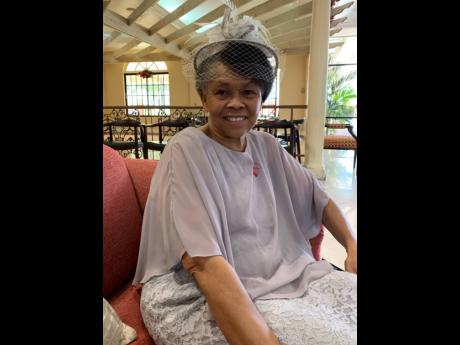(Jamaica Gleaner) Una Spencer had returned to Jamaica in 2012 to help her sister having lived in Canada for more than 40 years, but she has ended up gaining an extended family of survivors of HIV/AIDS.
The 67-year-old, who last year became a regional representative for the Jamaican Network of Seropositives – an advocacy group for people living with, and affected by, HIV and AIDS – said she contracted the virus from her now-deceased husband.
“I was over 50 when my husband gave it to me, and I did not realise that when you’re married, you should wear a condom, so it was a very hard thing for me to even accept. I find that when you’re of age and something like that happens, you become suicidal,” Spencer told The Gleaner.
She added: “I used to drive my car to work and I often had to stop my car on the side of the road and cry before I get to my patient at 7 o’clock in the morning,” she said.
Spencer was in attendance at the World AIDS Day Breakfast Forum held at The Knutsford Court Hotel on Friday. World AIDS Day is recognised internationally on December 1. This year’s theme is ‘Communities Make the Difference’.
A trained nurse, Spencer hosts a monthly check-up sessions at the Mandeville Comprehensive Clinic, which covers the parishes of Clarendon, Manchester and St Elizabeth.
“It’s been hard sometimes because some clients do not adhere to their medication … . Sometimes I have 21 people and sometimes I have a little less, but it is very important to me because I have people who call me and ask for help, even with food so I let them come to my farm,” a smiling Spencer said.
“I am glad this is the disease I got. It’s better than diabetes because diabetes, I’m gonna lose my leg or I’m gonna get blind. With this, all I have to do is take my medication and see my doctor every six months.”
Other than the low cost for treatment, as only a dispenser’s fee is charged, she has found a family in Jamaica.
“I would not know anybody if I didn’t have the HIV virus, so it’s a blessing to me in disguise,” said Spencer, who was born in Bartons, St Catherine.
HIV PREVALENCE
Senior medical officer of the HIV/STI/Tb Unit, Dr Nicola Skyers, presented a brief report on the status of HIV in Jamaica.
Since 1982, there have been 38,000 reported cases and more than 10,000 reported deaths.
For the year 2018, there were 1,165 newly reported cases, 16 per cent of which were among youths aged 15 to 24.
Skyers explained that there is a decrease in knowledge among young people and the lack of access to sexual and reproductive services for those who would need parental consent is a possible contributory factor.
Last year, 179 HIV deaths were reported, 104 of which occurred among men.
Skyers added that care for the HIV-positive is free within the public health sector, but outlined that there are scheduling challenges as work schedules often conflict with opening hours of health centres.
“That’s something that we are trying to address, but certainly, what it is that we need is for communities to support each other and for family to support persons living with HIV so they feel more empowered to access care,” Skyers said.
She said they have moved away from naming the clinics and they are now integrated into chronic care clinics for diabetes and hypertension, among other illnesses.






